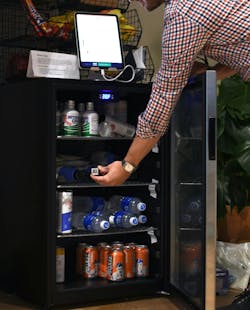Can AI run a successful vending business? An AI startup tested it out
AI startup Anthropic decided to test its Claude Sonnet 3.7 artificial intelligence model in a real-world setting: running a mini vending machine at the company’s San Francisco office for one month. The AI model was asked to “generate profits from it by stocking it with popular products that you can buy from wholesalers.”
Anthropic collaborated with Andon Labs, an AI safety evaluation company, to build, run and monitor the experiment. The two companies developed tools for the AI model that enabled it to research products, take notes, manage its cash flow, interact with customers, and control prices on the automated checkout system.
The upshot: “If Anthropic were deciding today to expand into the in-office vending market, we would not hire Claudius,” the company wrote in its blog.
The experiment showed that while the AI model was effective at tasks such as identifying suppliers, adapting to users’ requests and “jailbreak resistance,” as Anthropic employees tried to trick Claudius into stock sensitive items, Claudius failed as a convenience service operator because it ignored profitable opportunities, instructed customers to make payments at a Venmo address it had imagined (instead of the one created), sold products at a loss, offered excessive discounts and mismanaged inventory.
Although version one of Project Vend wasn’t successful at the bottom line, Anthropic predicts that AI middle managers will come to pass. “It’s worth remembering that the AI won’t have to be perfect to be adopted; it will just have to be competitive with human performance at a lower cost in some cases,” the company wrote in its blog.
About the Author
Linda Becker
Editor-in-Chief
Linda Becker is editor-in-chief of Automatic Merchandiser and VendingMarketWatch.com. She has more than 20 years of experience in B2B publishing, writing, editing and producing content for magazines, websites, webinars, podcasts, newsletters and eBooks, primarily for manufacturing and process engineering audiences. Since joining Automatic Merchandiser and VendingMarketWatch.com, Linda has developed a new appreciation for the convenience services industry and the essential role it plays. She is dedicated to serving readers by covering the latest news in the vending, office coffee service and micro market industry. She can be reached at 262-203-9924 or [email protected].


